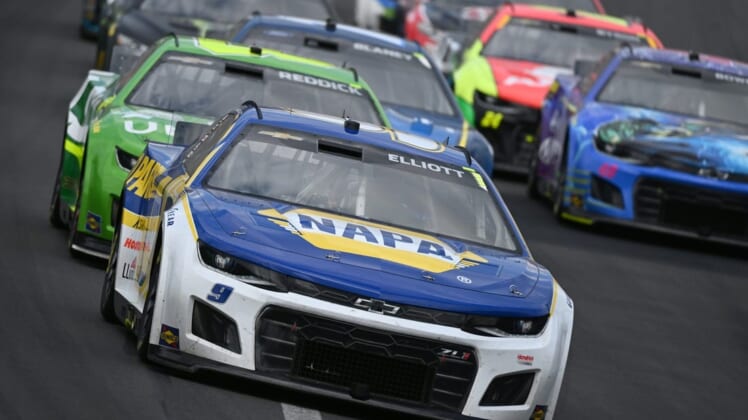
NASCAR changed its playoff system in 2004. It replaced its full-season standings with a playoff format, and it split the playoffs into two sections. These changes were made to improve television ratings and fan interest.
The Round of 16, the first segment, was the first of the playoffs. The Round of 16 was the first segment. It consisted three races. Each race's winner received ten points and a playoff point. The third-place driver was awarded eight points, and the fourth placed driver received seven.
The Round of 16 was the second segment of the playoffs. This round consisted of three races. The first race winner received ten points and a playoff point. The winner of race two received nine points, plus a playoff bonus point. The winner of third race received eight points. The fourth place driver was awarded seven points.

The Championship 4 was fourth segment in the playoffs. This round featured a race at Phoenix. The winner of this race was named champion. The winner received 15 bonus Playoff points.
The championship will be rescheduled for the last 10 races. It will be four-man competition in Phoenix. The NASCAR Cup Series champion will be the winner. After the season is over, the championship will go to the driver with the most points. The playoff seeding will be determined using the points system.
The points system is the most important aspect of the playoffs. Although the points system is simple, it can be complicated. The points system is a numerical scoring system that emphasizes winning more than consistency. Points are awarded on an a sliding scale in the playoffs. The point system is a good way to increase competition, and it could result in a championship after just two-thirds of the season.
It's possible to determine the championship mathematically even before the final race of the season. For example, a driver who finishes first, second, third and fourth in the regular season will win the championship. A driver who finishes eighth, ninth, and tenth in the regular season will finish last.

Win is the best way to get into the playoffs. The playoffs are almost guaranteed for a driver who wins a regular season race. The Championship 4 will be automatically won by the driver who finishes among the top eight points. If they win a race, those who finish in the top thirty in points will be eligible to advance to the playoffs.
Drivers who win in the playoffs get rewarded. NASCAR awards bonus points for regular-season wins in addition to their points system. These bonus points will be added onto the total points from each race. The top 10 drivers in regular season standings will receive bonus Playoff points.
The playoffs can be a great way of keeping fans engaged all season. The playoffs can be used in both the NASCAR Cup Series and the Gander RV Series. Some races were aired live on NBCSN in 2016.
FAQ
What is the fastest race car can accelerate?
A race car's acceleration rate varies depending on its weight.
For instance, a lighter car accelerates quicker than a heavy one.
Do race car drivers earn money?
Yes. Yes. Many race car drivers make a living wage.
However, there are some race car drivers who only make a small amount of money.
Is it possible to drive a racecar?
It takes dedication, hard work, and dedication. You have to practice all day long. You will not succeed if your efforts and time aren't consistent.
You need to be willing to sacrifice everything else for this dream. It's not about winning if your are fast enough.
Many people try to drive but don't make it because they aren't willing to do what it takes. They want to live an easier life.
They want to go home at night without putting in any extra effort. You have to be willing and able to give up all other things if you want success.
You must put in the work and hours if you want to race car driver.
How many people go into making a racecar?
Many race car manufacturers employ hundreds.
They produce components such as wheels and tires, suspension systems, engine components, and body panels.
What kind of cars do race car drivers use?
Modern racing cars use engines. These engines are very similar to those used in normal passenger cars.
But instead of using petrol, they run on compressed air.
What is the difference between racing and road cars?
A road car is intended to be driven on roads. For competitions like car racing, racing cars have been specifically designed. They have special aerodynamic features that help them accelerate quickly and brake sharply.
Statistics
- This change may give an improvement of up to 29% fuel efficiency. (en.wikipedia.org)
- In 2009, the slick tires returned as a part of revisions to the rules for the 2009 season; slicks have no grooves and give up to 18% more contact with the track. (en.wikipedia.org)
- In 2013 Ferrari had an estimated team budget of $470 million, while elite IndyCar teams have an estimated annual budget of $15 million, according to FormulaMoney. (businessinsider.com)
- According to Toyota, the 390-hp-plus 2019 Yaris WRC runs out of gearing after 124 mph, 19 mph less than the crazy Yaris GR that's currently sitting on dealer lots outside of the U.S. BONUS: (motortrend.com)
- According to AutoSport, IndyCar's top speeds are 380km/h or 236 mph. (motorbiscuit.com)
External Links
How To
How to get sponsors
To attract sponsors, it is important to have a strong following. You can begin by making connections with those who are already involved racing. They may be able help you secure sponsorship deals. You should also attend rallies, drag races and autocrosses. These types events will improve your social media presence and increase chances of landing sponsorships.